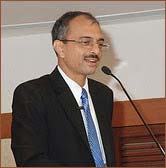While working with Franklin Templeton, Amit Trivedi realized that there was a vacuum in the training space of intermediaries (IFAs). To fill this gap, Amit decided to start a training academy, Karmayog. Jayshree Pyasi talks to the veteran and gets his insights on the industry
 Amit, as a veteran you have observed the industry closely. Who was a typical IFA 10 years back and who is he now? What are the key areas where he has evolved?
Amit, as a veteran you have observed the industry closely. Who was a typical IFA 10 years back and who is he now? What are the key areas where he has evolved?
An IFA ten years back was largely a distributor, only selling what was, for the want of a better word, in fashion. But in the past five years, there has been a radical change and the IFAs have evolved. Over the years, there has been a shift towards linking advice to distribution. They still sell products but are bundling free advice with those products.
What are your views on the changes (regulatory) that have impacted the distribution community?
There is indeed a certain amount of fear amongst the community because of the speed of change. But these SEBI moves are a reflection of the changes that are happening globally. The regulators want the industry to transition from transaction based commission to fee based advice, from opacity to transparency, from lower competency to higher. And I think it is not just the rules that have changed but the entire game.
Have the IFAs been able to cope up with the volatile regulatory environment?
Yes and a no. In 2007 there were around 90,000 ARN holders; today the number of distributors with KYD is around 43, 000. The distributors that decided to stick around were the serious players who were able to adapt to the regulatory changes. Many IFAs instead of being on the rebellious ground are asking the question ‘where I fit in’. And this has indeed reduced the struggle for the IFAs to survive. But it has not been easy to cope up with these changes.
Some IFAs say that their business has gone up post the entry load ban. According to you how true is this statement? Which segment benefitted by the entry ban?
There is a measure of merit in the statement because there has been shrinkage in the number of distributors as many of the IFAs shifted their focus away from MFs, whereas the number of investors increased. The people who stuck around improved their skills which also helped.
In knowledge and skills, where do you find the gaps in Indian advisory biz?
The knowledge and skills of IFAs have increased dramatically over the past 5 years. And the credit goes to IFAs, AMCs and regulator and to some extent media.
In 2005 - 2006, business was flowing and people felt no need to improve. After the entry load ban, after the initial cry of indignation, the distributors realized the need to upgrade themselves. Also, focus has been on becoming an advisor in the true sense.
How can IFAs use technology and social media effectively?
Technology can help IFAs understand compliance and increase productivity. Just like traditional media -print and TV, social media can help IFAs in reaching out to a large audience of potential investors.
IFAs don’t sell debt schemes. What are your views?
It is about advice. The basic difference between product selling and advice is what is at the centre of the decision – the product or the client’s needs. If the client needs debt products, can we offer? Yes, at the same time, one also must understand if one is in a position to advice on debt funds. The IFAs now should start advising products that suit the client. An advisor is an investment advisor - not equity or debt advisor and one cannot differentiate between asset classes based on incentives.
Your views on SEBI concept paper
I think that the concept paper is misunderstood by many people. The misunderstanding lies in terms of the earning potential between the two models of an agent and distributor. This paper is silent on regulation of agents as it is about regulation of advisors. Some fear that if the concept paper becomes a reality, agents will be able to earn more than advisors. But this is not correct. The margins for agents would shrink dramatically because of the market forces.
What feedback do you get from IFAs in your sessions?
I have been conducting learning sessions across the country and I have been asked for repeat programs. I think that speaks of the positive response. And post 2009, the participation in my knowledge sessions has increased considerably as the IFAs are now eager to increase their knowledge and skills.
What are the things IFAs should do to be successful in today’s world?
If you do right for the customer then you will not just survive but thrive. Think of clients as people not as folio numbers. IFAs need to embrace technology, understand compliance and improve their competence and efficiency
.



